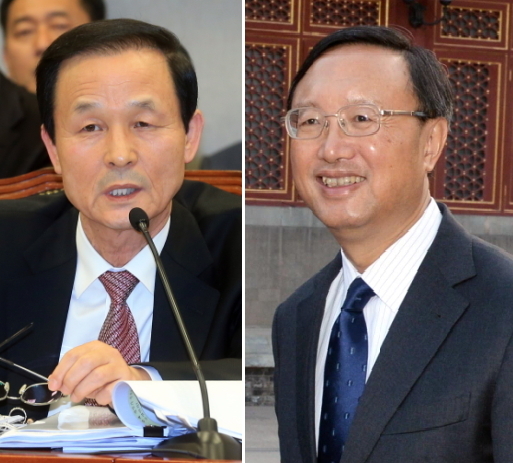
South Korean National Security Office chief Kim Jang-soo (left), Chinese State Councilor Yang Jiechi
Yang Jiechi, China’s state councilor in charge of foreign affairs, arrived in Seoul on Sunday to hold talks with senior South Korean officials over North Korea and other regional security and diplomatic issues.
Yang is to meet Kim Jang-soo, chief of the presidential office of national security, on Monday. Their talks were arranged after presidents Park Geun-hye of South Korea and Xi Jinping of China agreed during a summit in June to institute high-level strategic dialogue over security and diplomatic affairs.
On Seoul’s invitation, Yang came here along with other delegates including Vice Minister of Foreign Affairs Liu Zhenmin for a three-day agenda that includes his meetings with President Park and Foreign Minister Yun Byung-se.
Observers say the agenda for talks between Kim and Yang is expected to include the nuclear standoff with Pyongyang, Japan’s pursuit of the right to collective self-defense and other bilateral issues.
China has pushed for the resumption of the long-stalled multilateral denuclearization talks, but South Korea and the U.S. have maintained that Pyongyang should first make “sincere” action toward denuclearization.
The six-party negotiations, also involving Japan and Russia, have been on hiatus since December 2008 amid the North’s provocative acts and breach of international agreements.
Kim and Yang are also expected to exchange their views on Japan’s stepped-up push to expand its military reach.
South Korea and China, two major victims of Japan’s past militarism, are particularly concerned about Japan’s moves toward collective self-defense ― the use of force to counter an attack on an ally, namely the U.S.
Last week, Vice Defense Minister Baek Seung-joo told his Japanese counterpart during their meeting in Seoul that Tokyo’s exercise of the right to collective self-defense should not have a negative impact on regional stability and peninsular security.
As to Japan’s military buildup, there are still divergent views. Some argue that Japan’s heavier armament could revive Japan’s militaristic course, while others claim that Japan could be encouraged to use its military might for regional and global peace under the constraints of the U.S.-Japan alliance.
Also on the agenda may be whether Seoul would join the U.S.-led global missile defense program, which China and Russia believe could target them in case of contingencies involving the U.S.
South Korea has made clear that it would not join the multi-layered U.S. program. Instead, it seeks to establish an independent low-tier missile shield, designed to intercept incoming missiles at altitudes below around 50 km.
Since taking office in February, President Park has tried to improve relations with China ― the country’s crucial partner in trade, investment and tourism ― apparently with the recognition that the former government did not pay sufficient attention to China amid its focus on relations with the U.S.
On Tuesday, Yang is to tour the semiconductor factory of Samsung Electronics in Suwon, Gyeonggi Province, and nearby Hwaseong, a fortress designated as a World Heritage site in 1997 by UNESCO for its historical significance and unique architectural style.
By Song Sang-ho (sshluck@heraldcorp.com)



![[KH Explains] No more 'Michael' at Kakao Games](http://res.heraldm.com/phpwas/restmb_idxmake.php?idx=645&simg=/content/image/2024/04/28/20240428050183_0.jpg&u=20240428180321)


